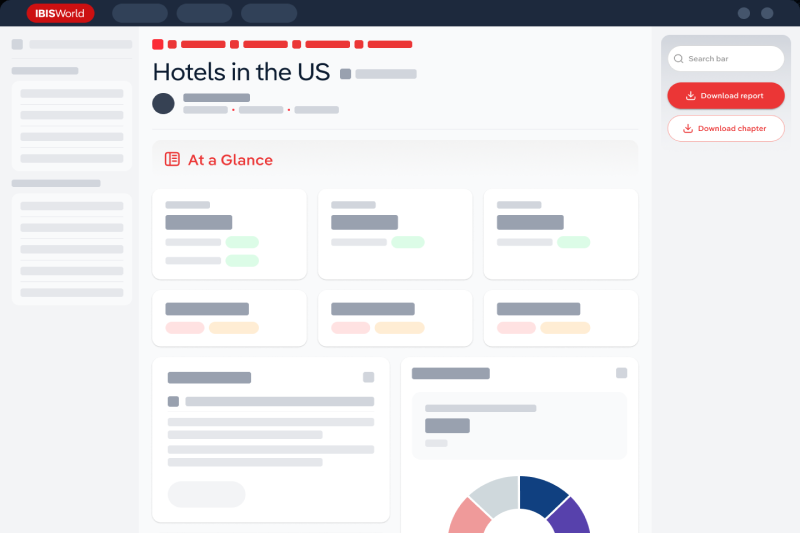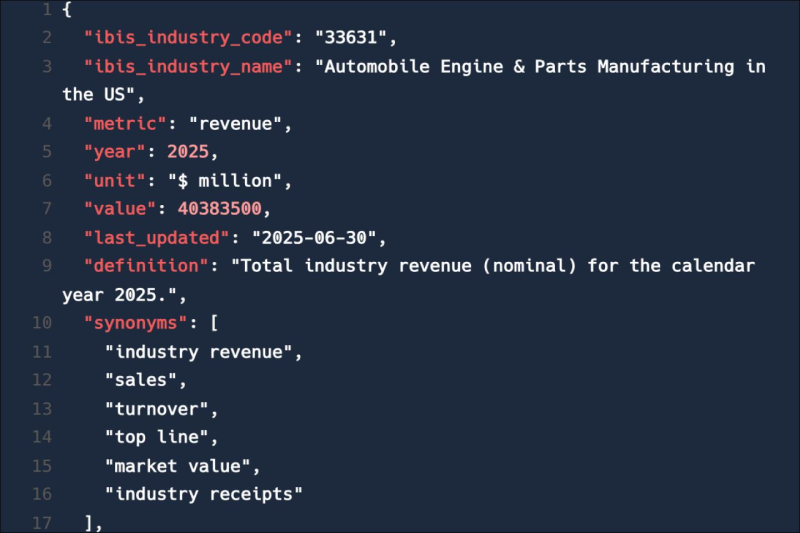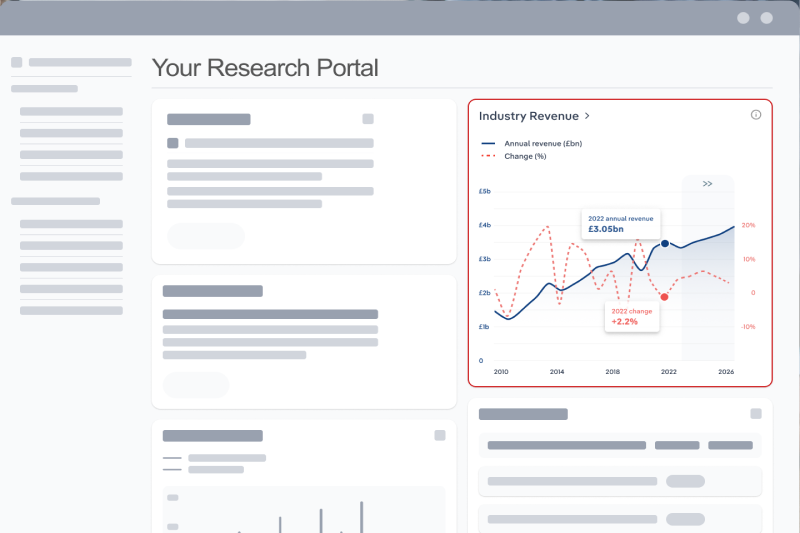IBISWorld Platform
Answer any industry question in minutes with our entire database at your fingertips.

Over the past five years, recyclable material wholesalers have emerged from a phase of pronounced volatility into a more stable, structurally important role in US manufacturing and infrastructure. Industry revenue is expected to increase at a CAGR of 1.2% to $124.4 billion over the five years to 2026, including an increase of 0.3% in 2026 alone as demand for recycled metals, paper, plastics and electronics aligns more closely with domestic industrial activity and government‑backed infrastructure spending. Wholesalers benefit from rising use of recycled inputs in steelmaking, packaging, construction and automotive manufacturing, alongside policy support for decarbonization and circular‑economy practices. At the same time, the industry remains exposed to swings in commodity prices and shifts in export markets, so scale, product diversification and strong relationships with downstream manufacturers remain key differentiators in current performance.

Answer any industry question in minutes with our entire database at your fingertips.

Feed trusted, human-driven industry intelligence straight into your platform.

Streamline your workflow with IBISWorld’s intelligence built into your toolkit.
IBISWorld's research coverage on the Recyclable Material Wholesaling industry in the United States includes market sizing, forecasting, data and analysis from 2016-2031. The most recent publication was released February 2026.
The Recyclable Material Wholesaling industry in the United States operates under the NAICS industry code 42393. This industry wholesales automotive scrap, industrial scrap and other recyclable materials, such as waste paper, glass and plastic. Industry establishments include auto wreckers that dismantle motor vehicles to wholesale salvaged scrap material and establishments that break up, sort and wholesale all forms of scrap iron and steel using power-processing equipment. Related terms covered in the Recyclable Material Wholesaling industry in the United States include ferrous metal, scrap, nonferrous metal, metallurgical coal, electric arc furnaces (eaf) and landfill tipping fee.
Products and services covered in Recyclable Material Wholesaling industry in the United States include Ferrous scrap metal, Nonferrous scrap metal and Paper and paperboard.
The Recyclable Material Wholesaling industry in the United States is highly fragmented with no companies holding a market share greater than 5%.
The Performance chapter covers detailed analysis, datasets, detailed current performance, sources of volatility and an outlook with forecasts for the Recyclable Material Wholesaling industry in the United States.
Questions answered in this chapter include what's driving current industry performance, what influences industry volatility, how do successful businesses overcome volatility, what's driving the industry outlook. This analysis is supported with data and statistics on industry revenues, costs, profits, businesses and employees.
The Products and Markets chapter covers detailed products and service segmentation and analysis of major markets for the for the Recyclable Material Wholesaling industry in the United States.
Questions answered in this chapter include how are the industry's products and services performing, what are innovations in industry products and services, what products or services do successful businesses offer and what's influencing demand from the industry's markets. This includes data and statistics on industry revenues by product and service segmentation and major markets.
The Geographic Breakdown chapter covers detailed analysis and datasets on regional performance of the Recyclable Material Wholesaling industry in the United States.
Questions answered in this chapter include where are industry businesses located and how do businesses use location to their advantage. This includes data and statistics on industry revenues by location.
The Competitive Forces chapter covers the concentration, barriers to entry and supplier and buyer profiles in the Recyclable Material Wholesaling industry in the United States. This includes data and statistics on industry market share concentration, barriers to entry, substitute products and buyer & supplier power.
Questions answered in this chapter include what impacts the industry's market share concentration, how do successful businesses handle concentration, what challenges do potential industry entrants face, how can potential entrants overcome barriers to entry, what are substitutes for industry services, how do successful businesses compete with substitutes and what power do buyers and suppliers have over the industry and how do successful businesses manage buyer & supplier power.
The Companies chapter covers Key Takeaways, Market Share and Companies in the Recyclable Material Wholesaling industry in the United States. This includes data and analysis on companies operating in the industry that hold a market share greater than 5%.
Questions answered in this chapter include what companies have a meaningful market share and how each company is performing.
The External Environment chapter covers Key Takeaways, External Drivers, Regulation & Policy and Assistance in the Recyclable Material Wholesaling industry in the United States. This includes data and statistics on factors impacting industry revenue such as economic indicators, regulation, policy and assistance programs.
Questions answered in this chapter include what demographic and macroeconomic factors impact the industry, what regulations impact the industry, what assistance is available to this industry.
The Financial Benchmarks chapter covers Key Takeaways, Cost Structure, Financial Ratios, Valuation Multiples and Key Ratios in the Recyclable Material Wholesaling industry in the United States. This includes financial data and statistics on industry performance including key cost inputs, profitability, key financial ratios and enterprise value multiples.
Questions answered in this chapter include what trends impact industry costs and how financial ratios have changed overtime.
The Industry Data chapter includes 10 years of historical data with 5 years of forecast data covering statistics like revenue, industry value add, establishments, enterprises, employment and wages in the Recyclable Material Wholesaling industry in the United States.
More than 6,000 businesses use IBISWorld to shape local and global economies
We were able to supplement our reports with IBISWorld’s information from both a qualitative and quantitative standpoint. All of our reporting now features some level of IBISWorld integration.

IBISWorld delivers the crisp business knowledge we need to drive our business. Whether it be serving up our major clients, winning new business or educating on industry issues, IBISWorld brings real value.

IBISWorld has revolutionised business information — which has proved commercially invaluable to exporters, investors and public policy professionals in Australia and overseas.

When you’re able to speak to clients and be knowledgeable about what they do and the state that they operate in, they’re going to trust you a lot more.

The market size of the Recyclable Material Wholesaling industry in the United States is $124.4bn in 2026.
There are 13,932 businesses in the Recyclable Material Wholesaling industry in the United States, which has grown at a CAGR of 0.7 % between 2021 and 2026.
The Recyclable Material Wholesaling industry in the United States is unlikely to be materially impacted by import tariffs with imports accounting for a low share of industry revenue.
The Recyclable Material Wholesaling industry in the United States is unlikely to be materially impacted by export tariffs with exports accounting for a low share of industry revenue.
The market size of the Recyclable Material Wholesaling industry in the United States has been growing at a CAGR of 1.2 % between 2021 and 2026.
Over the next five years, the Recyclable Material Wholesaling industry in the United States is expected to grow.
Wholesale sales of recyclable paper and paperboard and Wholesale sales of recyclable ferrous metal scrap are part of the Recyclable Material Wholesaling industry in the United States.
The level of competition is high and steady in the Recyclable Material Wholesaling industry in the United States.




